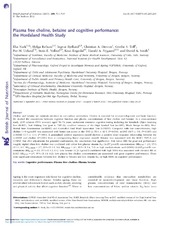Plasma free choline, betaine and cognitive performance: the Hordaland Health Study
Nurk, Eha; Refsum, Helga; Bjelland, Ingvar; Drevon, Christian A; Tell, Grethe S; Ueland, Per Magne; Vollset, Stein Emil; Engedal, Knut Arne; Nygaard, Harald A.; Smith, David A
Peer reviewed, Journal article
Published version

View/
Date
2013-02Metadata
Show full item recordCollections
Original version
https://doi.org/10.1017/s0007114512001249Abstract
Choline and betaine are nutrients involved in one-carbon metabolism. Choline is essential for neurodevelopment and brain function. We studied the associations between cognitive function and plasma concentrations of free choline and betaine. In a cross-sectional study, 2195 subjects (55 % women), aged 70–74 years, underwent extensive cognitive testing including the Kendrick Object Learning Test (KOLT), Trail Making Test (part A, TMT-A), modified versions of the Digit Symbol Test (m-DST), Block Design (m-BD), Mini-Mental State Examination (m-MMSE) and Controlled Oral Word Association Test (COWAT). Compared with low concentrations, high choline (>8·4 μmol/l) was associated with better test scores in the TMT-A (56·0 v. 61·5, P= 0·004), m-DST (10·5 v. 9·8, P= 0·005) and m-MMSE (11·5 v. 11·4, P= 0·01). A generalised additive regression model showed a positive dose–response relationship between the m-MMSE and choline (P= 0·012 from a corresponding linear regression model). Betaine was associated with the KOLT, TMT-A and COWAT, but after adjustments for potential confounders, the associations lost significance. Risk ratios (RR) for poor test performance roughly tripled when low choline was combined with either low plasma vitamin B12 ( ≤ 257 pmol/l) concentrations (RRKOLT= 2·6, 95 % CI 1·1, 6·1; RRm-MMSE= 2·7, 95 % CI 1·1, 6·6; RRCOWAT= 3·1, 95 % CI 1·4, 7·2) or high methylmalonic acid (MMA) ( ≥ 3·95 μmol/l) concentrations (RRm-BD= 2·8, 95 % CI 1·3, 6·1). Low betaine ( ≤ 31·1 μmol/l) combined with high MMA was associated with elevated RR on KOLT (RRKOLT= 2·5, 95 % CI 1·0, 6·2). Low plasma free choline concentrations are associated with poor cognitive performance. There were significant interactions between low choline or betaine and low vitamin B12 or high MMA on cognitive performance.